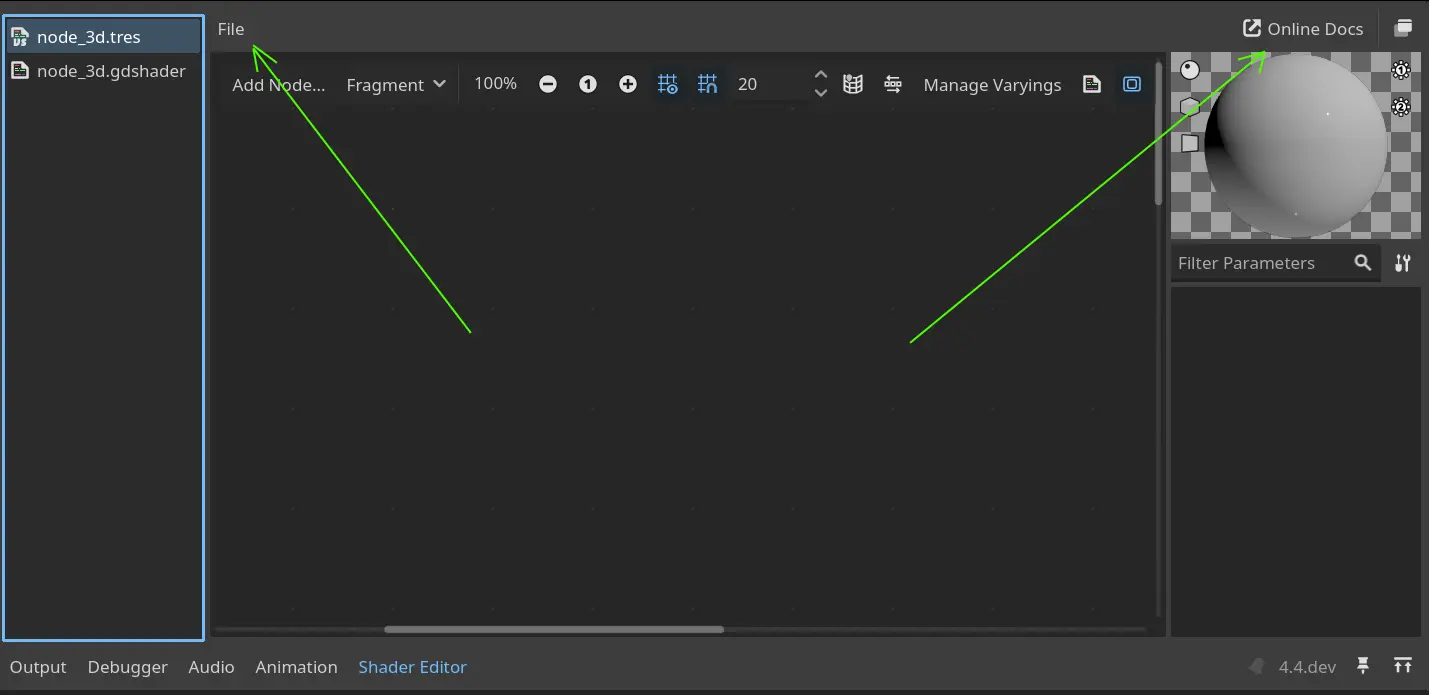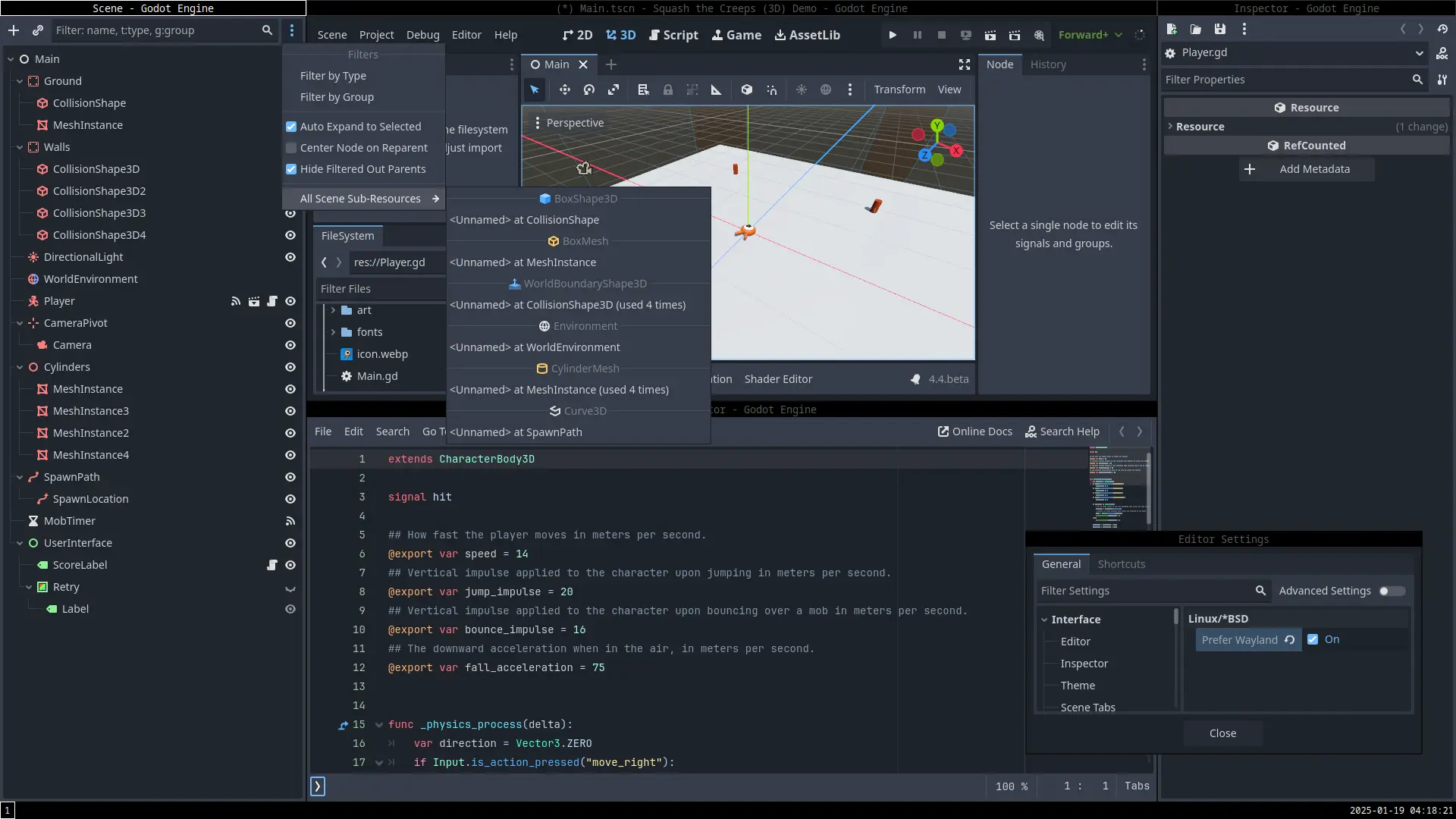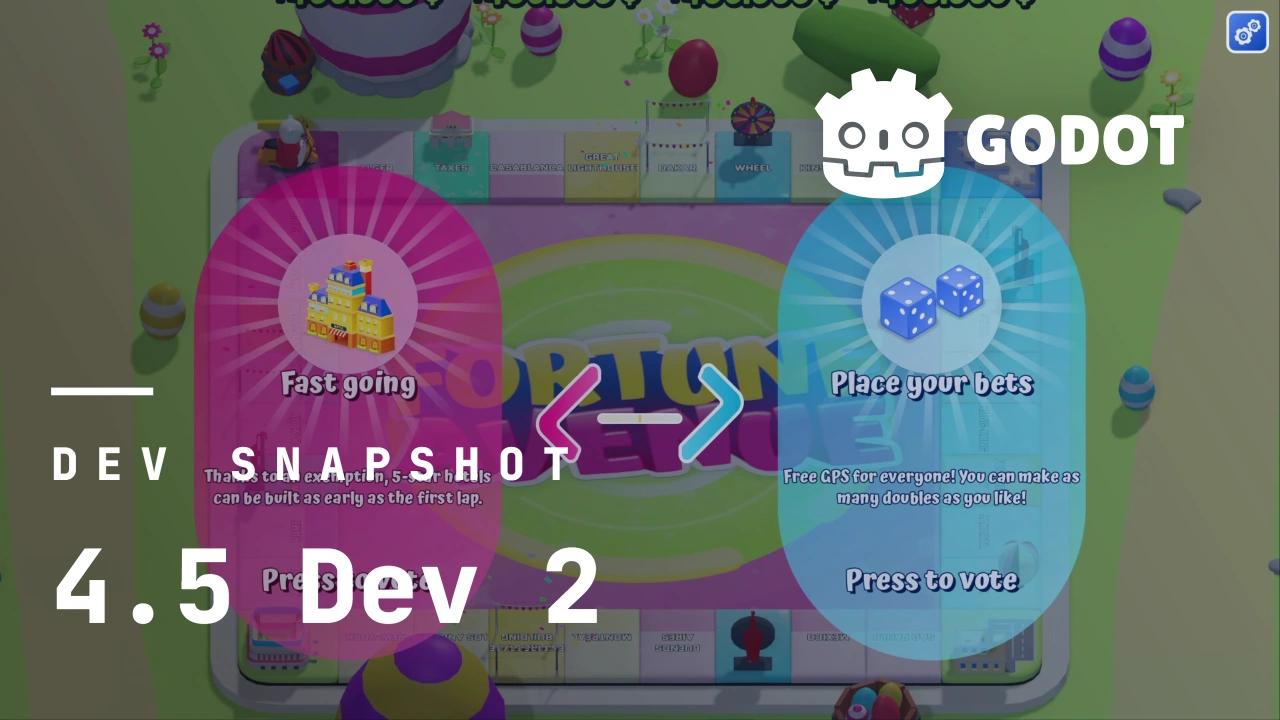With the 4.4 release a little over a month ago, one might’ve expected content updates to trickle out slowly for our initial 4.5 development snapshots. …Well, maybe not after seeing the 4.5 dev 1 snapshot, but surely they couldn’t follow that up with another flood of anticipated changes, right?
You fools. You underestimate the passion of our community yet again, as 250 improvements are ready to roll for this snapshot. What’s more is that, unlike last time, we’re not just in bugfix territory any more. Now the time for proper enhancements and features entirely unique to this development cycle has come, and this blogpost will aim to highlight them to the best of our ability. As always: with new features comes new bugs (probably), so the sooner we can get feedback and bug reports in, the better.
Jump to the Downloads section, and give it a spin right now, or continue reading to learn more about improvements in this release. You can also try the Web editor or the Android editor for this release. If you are interested in the latter, please request to join our testing group to get access to pre-release builds.
The cover illustration is from Fortune Avenue, a capitalism simulator where you shrewdly extort and outmaneuver your friends in a chaotic, board-game environment. It is developed by Binogure Studio. You can wishlist the game on Steam and follow the developers on Bluesky.
Highlights
In case you missed them, see the 4.5 dev 1 release notes for an overview of some key features which were already in that snapshot, and are therefore still available for testing in dev 2.
Dedicated 2D navigation server
For the longest time, the navigation server was a unified beast. 3D and 2D, Yin and Yang, two sides of the same coin. While beautiful on a philosophical level and undoubtedly a heart-wrenching screenplay waiting to happen, it was a pretty sour deal for the 2D side of things. Previously, if you were making a 2D game and wanted to make use of navigational features, you were effectively locked into a bunch of 3D settings and features that would never see any use but would absolutely see a bump in output size.
Steps have been taken during this initial 4.5 period to ensure that navigation logic is more cleanly divided and organized, spearheaded by our navigation guru smix8, but none of this could’ve been possible without cleanly splitting the navigation server in twain. Longtime contributor AThousandShips took the mantle on this project, and she successfully accomplished this goal with GH-101504. From now on, users will be able to selectively enable/disable the navigation modules for 2D and/or 3D, instead of being forced into an all-or-nothing ultimatum.
Reorganized shader editor UI
The editor experience for shaders and visual shaders got some TLC in GH-100287. Helmed by Yuri Rubinsky, this PR provides several requested features and QOL updates to our shading friends. Below is a preview image taken directly from the PR in question, where you’ll find more information on what to expect when you get your hands on it this snapshot.

Changing editor language without restart
Godot has built-in support for handling multiple languages, both for the games you create and the editor itself. However, in contrast to games built with the engine, it wasn’t possible to change the current language on-the-fly within the editor itself. Our editor expert Tomasz Chabora addressed this issue in GH-102562, ensuring that users can swap to their preferred language within the same editor session! While this is somewhat niche in practice, our stance on convenience and accessibility is one that we take very seriously, and a seamless/streamlined editor experience is exactly the sort of thing we want as many users as possible to enjoy.
Fragment density map support
When rendering for VR headsets, the pixels around the outside of the viewport are less important, because they will be somewhat distorted by the lens, and players will tend to turn their head rather than move their eyes too far from the center.
Godot already supports using the Vulkan “Fragment Shading Rate” extension to render the outside of the viewport at a lower resolution, leading to performance improvements with little noticeable decrease in quality. However, on standalone VR headsets (like the Meta Quest), this extension either isn’t supported, or doesn’t provide as big performance improvements as the Vulkan “Fragment Density Map” extension.
In GH-99551, rendering expert DarioSamo has implemented support for the “Fragment Density Map” extension, making the Vulkan Mobile renderer more viable for VR on standalone headsets.
Wayland: Native sub-window support
Thanks to the tireless efforts of Riteo, the X11 alternative Wayland has been given first-class treatment on Godot. It’s been a long road to stand as an equal to such a dominant display server protocol, but it’s getting closer with every passing PR; though some have been hesitant to make the change for one reason: lack of native sub-windows. Taking on this hurdle for parity was no small feat, but it was a requirement for supporting embedded game windows on Wayland, so (GH-101774) made it happen all the same:

And more!
There are too many exciting changes to list them all here, but here’s a curated selection:
- 2D: Optimize usability of VisibleOnScreenNotifier2D (GH-100874).
- 3D: Allow customizing debug color of Path3D (GH-82321).
- Animation: Add
deltaargument to_process_modification()as_process_modification_with_delta(delta)and exposeadvance()atSkeleton3D(GH-103639). - Animation: Add selection box movement/scaling to the animation bezier editor (GH-100470).
- Core: Optimize
Object::cast_toby assuming no virtual and multiple inheritance, gaining 7x throughput overdynamic_cast(GH-103708). - Editor: Add UID to file tooltip (GH-105069).
- Editor: Improve default/no query quick open dialog behavior (GH-104061).
- Editor: Remove New prefix from EditorResourcePicker (GH-104604).
- Export: Updates and fixes to the Android prebuilt export logic (GH-103173).
- GDScript: Return early when parsing invalid super call (GH-104509).
- GUI: Improve Popup
content_scale_factor(GH-104399). - GUI: Optimize startup times by using
ubrk_cloneinstead ofubrk_open(GH-104455). - GUI: Scroll
EditorInspectorwhile drag & drop hovering near the edges (GH-103943). - Import: Load decompressable texture format if no supported one is found (GH-104590).
- Navigation: Allow compiling templates without navigation features (GH-104811).
- Physics: Allow compiling templates without physics servers (GH-103373).
- Physics: Jolt: Update to 5.3.0 (GH-104449).
- Porting: Android: Add an editor setting to enable/disable
TouchActionsPanel(GH-105015). - Porting: Android: Add support for
Mute Gametoggle (GH-104409). - Porting: Android: Auto create
nomediafile to hide project files in media apps (GH-104970). - Porting: Linux: Detect KDE/LXQt and swap OK/Cancel buttons to Windows style (GH-104959).
- Porting: macOS: Replace custom main loop with
[NSApp run]andCFRunLoopobserver (GH-104397). - Porting: macOS: Support more controllers on macOS 11+ (GH-104619).
- Rendering: Avoid using a global variable to store instance index in canvas items shader in RD renderer (GH-105037).
- XR: Deactivate the
CameraServerby default (GH-104232). - XR: OpenXR: Clean-up
OpenXRExtensionWrapperby removing multiple inheritance and deprecatingOpenXRExtensionWrapperExtension(GH-104087).
Changelog
90 contributors submitted 250 fixes for this release. See our interactive changelog for the complete list of changes since the previous 4.5-dev1 snapshot.
This release is built from commit af2c71397.
Downloads
Standard build includes support for GDScript and GDExtension.
.NET build (marked as mono) includes support for C#, as well as GDScript and GDExtension.
While engine maintainers try their best to ensure that each preview snapshot and release candidate is stable, this is by definition a pre-release piece of software. Be sure to make frequent backups, or use a version control system such as Git, to preserve your projects in case of corruption or data loss.
Known issues
There are currently no known issues introduced by this release.
With every release we accept that there are going to be various issues, which have already been reported but haven’t been fixed yet. See the GitHub issue tracker for a complete list of known bugs.
Bug reports
As a tester, we encourage you to open bug reports if you experience issues with this release. Please check the existing issues on GitHub first, using the search function with relevant keywords, to ensure that the bug you experience is not already known.
In particular, any change that would cause a regression in your projects is very important to report (e.g. if something that worked fine in previous 4.x releases, but no longer works in this snapshot).
Support
Godot is a non-profit, open source game engine developed by hundreds of contributors on their free time, as well as a handful of part and full-time developers hired thanks to generous donations from the Godot community. A big thank you to everyone who has contributed their time or their financial support to the project!
If you’d like to support the project financially and help us secure our future hires, you can do so using the Godot Development Fund.
